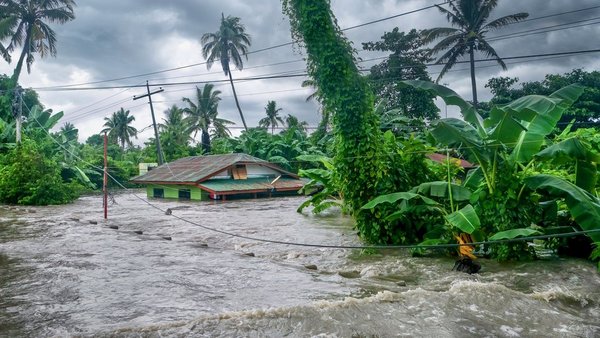
Major floods on Mindoro Island, Philippines, 2021.
Photo: © Wirestock Creators/Shutterstock.com
- Share this article
- Subscribe to our newsletter
Asia Pacific most affected by weather risks
Climate change will be the main driver of future economic risks, with countries in the Asia Pacific region among the most vulnerable to extreme weather events, according to new analysis published in February 2024 by the Swiss Re Institute, the research arm of global insurance firm Swiss Re.
Four weather perils – floods, tropical cyclones, winter storms and severe thunderstorms – account for the largest share of economic losses from natural disasters globally. The analysts argue that private sector finance must be mobilised to mitigate these risks and adapt to climate change.
Of 36 countries studied, the Philippines is the most impacted by tropical cyclones, severe thunderstorms and floods, and these hazards are highly likely to intensify here. The resulting property damage leads to annual economic losses of 3 per cent of the country’s GDP – eight times more than any other nation.
The US and Thailand are the next worst affected, with GDP losses of around 0.4 per cent. Other Asia Pacific countries in the list include China, Taiwan, India and Japan, all with GDP losses of around 0.2 per cent or more. Tropical cyclones are the major factor for weather-related economic losses in east and south-east Asia, according to Jérôme Jean Haegeli, group chief economist at Swiss Re.
The Paris Agreement’s aim is to keep global temperature rise this century to well below 2 degrees Celsius above pre-industrial levels and to pursue efforts to limit the temperature increase to 1.5 degrees Celsius.
However, it is estimated that emissions will continue to rise until 2030, putting the world on a path to 2.7 degrees Celsius of warming by 2100, according to Climate Action Tracker. If global warming remains on the current trajectory, Swiss Re’s 2021 report noted that the world could lose 7 to 10 per cent of GDP by 2050.
The latest report draws on scientific evidence from the Intergovernmental Panel on Climate Change (IPCC) on the probability of more severe weather conditions in different countries, as well as Swiss Re’s insurance knowledge of property damage resulting from natural disasters. It says that in terms of impact on people’s property, the four major weather perils alone result in expected economic losses of USD 200 billion annually.
(Neena Bhandari, Scidev.Net/ile)




Add a comment
Be the First to Comment